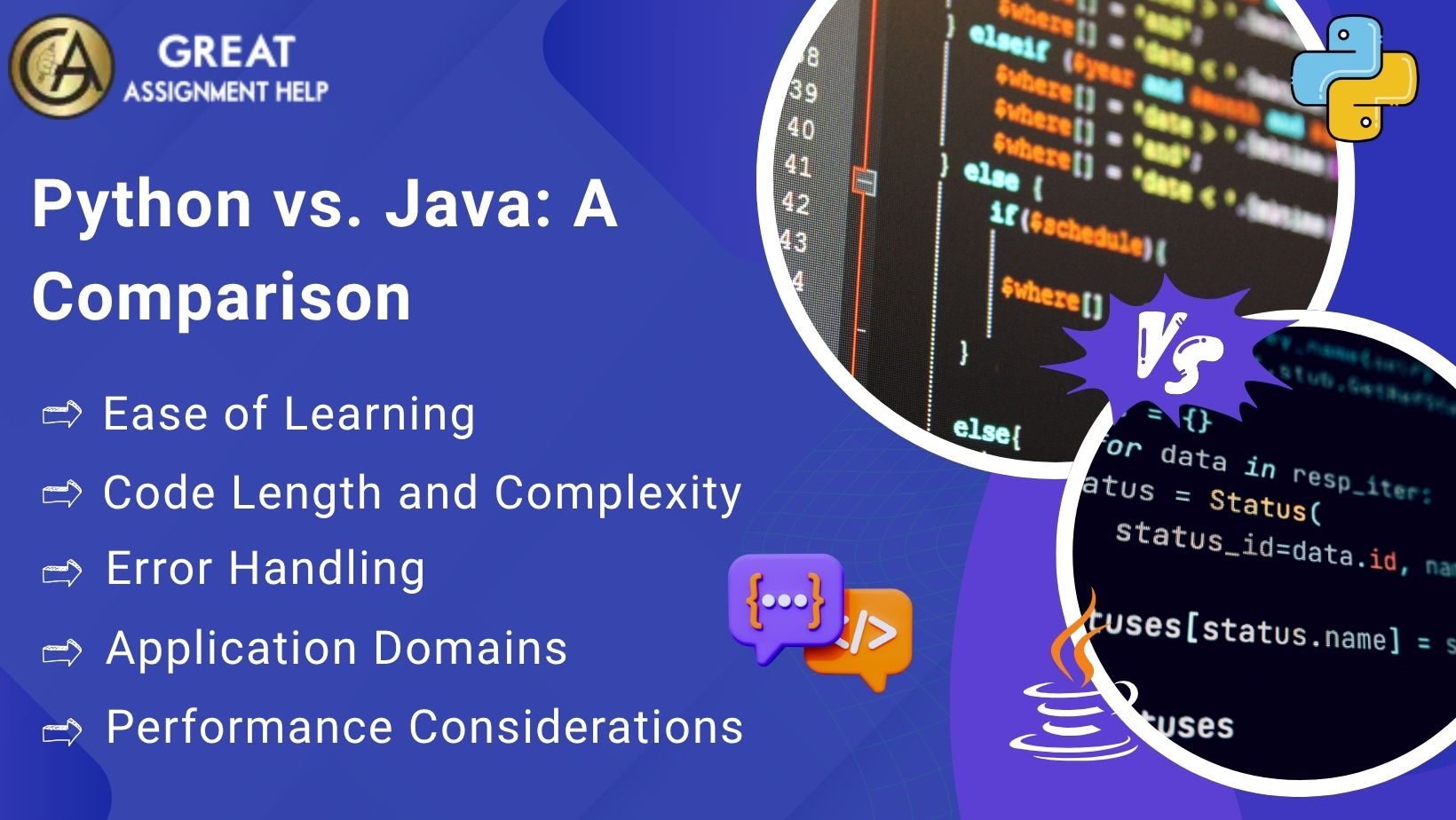Python vs. Java programming assignments differ in how easy they are for students. Python is beginner-friendly with simple syntax and dynamic typing, so tasks are quicker to finish. On the other hand, Java follows strict syntax, verbose structure, and an object-oriented paradigm, which can make programming assignments harder, especially for beginners.
Python and Java are two of the most popular programming languages, each with its own features, benefits, and challenges. When it comes to working on programming assignments, the majority of the students struggle to choose between these two options. However, knowing about Python vs. Java will help students choose the language that suits their learning style and project needs and easily complete their programming assignments. If you are a student who is confused about which programming language to select for your programming assignment, then read this blog. Here, we have shared the main differences between Python and Java, their advantages and disadvantages, features, common uses, and how they affect the difficulty of assignments.
What is Python?
Python is a high-level, interpreted programming language that is very popular because it is simple and easy to read. Its syntax looks a lot like English, which makes it great for beginners to write error-free source code. Since Python focuses on clear and readable code, you can easily use it to express your ideas with fewer lines than many other programming languages.
Features of Python
These are some key features of Python:
- Dynamic Typing: In Python, variable types are set automatically. This makes coding faster and easier.
- Interpreted Language: Python executes code line by line. Hence, you can easily spot and fix errors during execution.
- Extensive Libraries: Python offers many built-in libraries that simplify tasks like web development, data science, and AI. So, you don’t have to code everything from scratch.
- Cross-Platform Support: Python programs work on different operating systems like Windows, Mac, or Linux, without changing the code. This makes them very convenient to use.
Pros of Python
- Python has a simple and beginner-friendly syntax.
- Python is easy to learn and write.
- It supports different programming styles, including procedural, object-oriented, and functional programming.
- Python enables faster development by letting you write simpler and shorter code.
- Python has strong frameworks and libraries like Django and Flask for web development and TensorFlow, Scikit Learn, and PyTorch for machine learning and data science.
Cons of Python
- Python runs slower than compiled languages like Java.
- Python’s lack of true multithreading limits its performance and prevents it from fully using modern CPUs.
- It is not the best choice for developing mobile applications.
- In Python, variable types are determined at runtime, which can cause errors while the program runs and may confuse beginners.
- Python’s database connectivity is limited and less efficient.
Python is popular among students for its simplicity, but larger projects can be tricky due to its flexible typing, which can cause errors. Many students seek Python Assignment Help to improve code efficiency and understand complex data structures.
What is Java?
Java is a programming language that uses a fixed type system and focuses on objects to organize code. It is designed to run fast and work on many different devices without changes. Java follows the idea of “write once, run anywhere”. It means a program can run on any system that supports Java. People often use Java to build business software, Android apps, and large systems.
Features of Java
The following are some salient features of Java:
- Compiled Language: Whenever you write Java code, it gets converted into bytecode that runs on the Java Virtual Machine (JVM).
- Static Typing: When you write source code in Java, you must declare the type of each variable. This is because it will help you catch mistakes before running your program.
- Platform Independence: You can run your Java programs on any device that has a JVM, without changing your code.
- Robust Standard Library: When you use Java, you will get access to many built-in tools and APIs for things like networking, databases, and creating graphical user interfaces.
Pros of Java
- Java is great for creating large and complex programs or systems.
- It runs fast and uses memory efficiently because it’s a compiled language.
- Java supports multithreading and has automatic memory management.
- Java’s compiled nature, static typing, and strict syntax make it highly stable, backward compatible, and largely error-free.
Cons of Java
- Java is wordy with complex syntax full of braces and semicolons.
- The complex nature of Java makes it hard for beginners to learn.
- Writing Java programs can be slower because it requires more detailed coding.
- Java applications often use more memory because their garbage collection isn’t very efficient.
Many students struggle with Java initially due to its strict rules and object-oriented approach. However, learning it allows you to build robust, maintainable programs. If needed, Java Assignment Help can guide you in improving your skills, understanding concepts, and creating error-free code.
Python vs. Java: A Comparison

If you are doubtful about whether to choose Java or Python for your programming assignments, then explore Python vs. Java. This comparison will help you make the right choice. Here are some common differences between Python and Java assignments
Ease of Learning
Python is easy to read and use. This makes it simple for beginners to learn programming. Java is more powerful but needs a better understanding of objects, data types, and memory, so students often find Python assignments easier.
Code Length and Complexity
Python usually lets you do the same tasks with less code, which is helpful for programming assignments with tight deadlines. Java, on the other hand, uses longer, more detailed code that helps catch errors but takes more time to write.
Error Handling
In Python, errors usually appear while the program is running because it doesn’t enforce strict types. This can sometimes cause unexpected problems if the errors aren’t handled properly. In Java, the strict type system catches many errors before the program runs. This makes the code safer but also more complex to write.
Application Domains
Both Python and Java are widely used, but they serve different purposes. Python is great for data science, AI, web development, and automation. Java is commonly used for big business applications, Android apps, and system programming. Knowing these differences will help you match your assignments to real-world uses.
Performance Considerations
Python runs slower because it is interpreted, but its simplicity can make assignments faster to finish. Java, being compiled, runs faster, which is important for high-performance programs, but it doesn’t make much difference for simple assignments.
Conclusion
Based on the differences shared above, you can conclude which programming assignments are tougher. Python assignments are usually easier because the language is simple and quick to use. Java assignments can be harder for beginners because the code is longer and you need to understand object-oriented concepts. But how hard an assignment is depends not just on the language, but also on the project’s size, requirements, and how familiar you are with programming. If you struggle to do your academic tasks, get Programming Assignment Help from our team of coding experts. They will guide you in understanding the language, fixing errors, and improving your code.
FAQs
1. Is Python easier than Java for beginners?
Yes. Python is easier for beginners because its code is simple and easy to read. But Java is more structured and requires a strong understanding of object-oriented principles and strict type declarations.
2. Can I use Java for data science projects?
Yes, you can use Java for data science projects. But Python is usually preferred because it has more libraries and community support for machine learning, AI, and data analysis.
3. Do Python assignments take less time than Java assignments?
Yes, Python lets you write shorter, simpler code, so assignments take less time. But Java’s longer, detailed code and extra checks can make assignments take more time to complete.
4. Which language is better for developing large-scale applications?
Java is usually better for high-performance, large-scale applications because it runs fast, has strict typing, and manages memory well. Python is better for quickly building and testing programs when development speed is more important than running speed.



